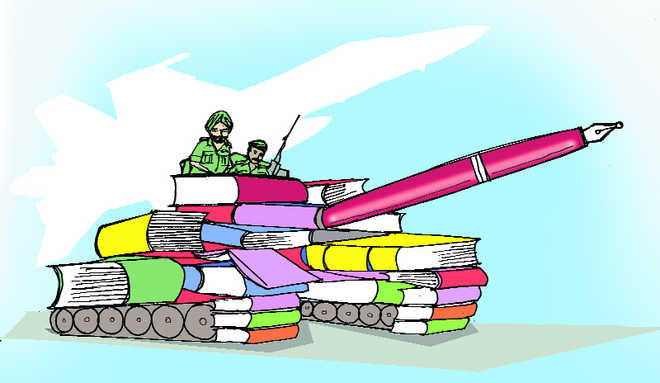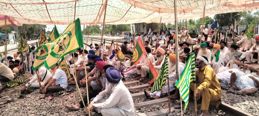
Illustration: Sandeep Joshi
Lt Gen Baljit Singh (retd)
“No battle is ever won, he said. They are not even fought. The field only reveals to man his own folly and despair, and victory is an illusion of philosopher and fools” — Anonymous
When at the stroke of midnight on August 15, 1947, Prime Minister Nehru made an impassioned appeal to his fellow countrymen to arise and embrace their “tryst with destiny”, the Indian Army was a tried and tested, highly motivated and among the most dependable organs of the new republic. It had a proud heritage of valour on battlefields at home and across the oceans — stretching back in time at least 150 to 200 years. By and large, the rank-and-file were un-lettered, but they had few peers when the occasion demanded the ultimate in commitment, that is, “last man to the last round”. But they made no pretensions about literary inclinations or pursuits, seldom reading and much less writing.
So all genre of recorded military histories of the times, remained the preserve of officers who, till the 1930s, were Britons. However, once the officer-cadre was opened to Indians, they won plaudits for leadership on battlefields and post August, 1947 India’s lieutenant colonels would get accelerated promotions to brigadiers and major generals. Young and inspired by the trust reposed, several among them would wield the pen with as much flair as they did the proverbial sword. And as all bright sparks were shifted from one leadership role to another, they acquired a fund of new experiences both in the form of oral histories as also memos recorded on secret files.
The beginning
A few such officers penned their experiences after superannuation, and the first book of note, Slender was the Thread was authored by Lt Gen L P Sen, DSO, who, as a Brigadier along with a few hundred soldiers, was air-landed in the wee hours of October 27, 1947, upon a make-shift air-strip near Srinagar. This book is a fascinating and balanced recounting of the 1947-1949 J&K War.
Cruel as all wars are, these are also a crucible of new endeavours, successes and failures in equal measures. So, the twilight period of India’s Independence prompted certain soldiers to seek premature retirement and take up writing as their calling in life henceforth. Manohar Malgonkar was one such officer (a graduate in English and Sanskrit), who had served in the Maratha Light Infantry in Field Marshal Slim’s 14th Army in Burma and rose to a Lieutenant Colonel by 1948. After he hung up his boots and settled near Belgam, he published a beguiling novel, Distant Drum.
As may be imagined, Malgonkar’s fiction is woven around the gripping, nostalgic life and times of officers and their battalion (4th Satpura Rifles) in peace and war, ending with the protagonist Captain Kiran Gaud engaged in conversation across the Cease-fire Line in J & K with a Pakistan Army officer. Kiran is jolted to learn that the lost love of his foe was none other than Bina, his wife. Such are the vicissitudes of war. Malgonkar went on to write eight more books, including A Bend in the Ganges, that was adapted into a Hollywood movie; and more importantly Kanhoji Angrey, arguably India’s pioneer of maritime warfare.
Heat and dust of defeat
Perhaps few other armies had emerged from WW II with comparable, much applauded war-fighting reputation than the Indian armed forces. But come October-November 1962 India-China War, and an unblemished image of some 200 years standing was ruined in mere 20 days. The field commander, Lt Gen B M Kaul would hurriedly publish The Untold Story, but no one cared to pick, leave alone read that book. Brig J P Dalvi, Commander of the Namka Chhu battle zone, published Himalayan Blunder, which is an honest narrative of where he personally failed and yet how his ill-clad, poorly equipped soldiers, outnumbered by a factor of five by the enemy, valiantly stood their ground, till annihilation.
Unlike Dalvi, the narrative of skirmishes and battles from Bum La, down to Bomdila as witnessed and narrated by Brig Darshan Khullar (at the time a subaltern of less than two years service) in his book, When Generals Failed, makes a refreshing reading of the death-defying conduct of soldiers in trenches and lower-rung officers — neither of whom were ever short on guts and grit. Darshan’s personal shenanigan to go back to an abandoned rations dump, north of Se La under sniper-fire by the PLA, to fetch a sack of sugar for his men and another one to get beer bottles for his buddies, truly sums up the never-say-die ethos of soldiers.
But this subaltern was wiser than his years in stating that “India could have defeated the Chinese, or at least given them a bloody nose, if only there had been one great General and a few good brigadiers to seize the opportunity.”
Defeat in battle infuses indomitable spirit even among the kin of soldiers and it is, therefore, not surprising that an officer’s progeny (whose father’s battalion had more than 280 casualities) would publish, in 2016, perhaps what is the best in Indian war literature, 1962 — The War That Wasn’t. Shiv Kunal Verma, with a hindsight of five decades and a decade-long research, provides 400 pages of compelling, scholarly text, which holds interest to the last word. A strip photograph on the imaginative cover shows two IAF planes airborne and right below on terra ferma, four jawans can be seen evacuating a wounded comrade wrapped in a dusty swath, strapped atop a yak — strikingly epitomising the archaic conditions under which the Indian Army had fought the Chinese. But did the Army betray its oath of allegiance? Well, here is Verma’s emphatic no; PVC 1 (Posthumous, JCO), MVC 11 (Officers 6, Other Ranks 5), VrC 31 (Officers11, JCOs 4, Other Ranks 16).
Courting glory
Come 1965, and the armed forces would grab the chance of wiping clean the humiliation of the searing defeat of 1962. The war had commenced with military setbacks both in the Chhamb Sector of J&K and on the Ichogil Canal beyond Amritsar. Lt Gen Harbakhsh Singh, PVSM, VrC in his book War Dispatches and autobiography, In the Line of Duty (published posthumously), gives a lucid account of events, but refrains from passing judgements on personalities; certainly not on his superior, Gen J N Chaudhury, the COAS, who was rumoured to have panicked and advised a disastrous military recourse to General Harbakhsh Singh. Mercifully, the autobiography scotches that unholy rumour, altogether.
A magnum opus worth cherishing
If the General showed the war through macro narratives, his ADC, Captain Amarinder Singh (retd.), and Lt Gen Tajindar Shergill (retd.), PVSM, have provided a brilliant magnum opus of 528 pages, The Monsoon War, bringing alive combat actions from the grass roots, upwards to the COAS. Perhaps the raison d’etre are the 135 full-page maps of combat actions, conceived so imaginatively that one may skip the text altogether; all maps are courtesy Lt Gen Mahmud Ahmad, Pakistan Army, from his book, Illusions of Victory!
Memoirs galore
Back home, the 1971 War, for the first time, committed the Indian Army simultaneously on the Western and the Eastern borders with Pakistan. Lt. General K P Candeth, who fielded the Western Army, wrote a blow-by-blow account of the conflict in a matter-of-fact style without any literary pretensions.
But of all the books penned by uniformed men post 1947, Surrender At Dacca: Birth of a Nation, by Lt Gen JFR Jacob is by far one of the better military history narratives judged by any yardstick. One hall-mark of good military history (besides being factually truthful) is that it should hold the interest of a military and civilian reader alike. By my reckoning, General Jacob’s book meets these criteria admirably.
In my reckoning, the two sterling additions to military literature were, Musings and Memories by Maj Gen D K Palit VrC, and Lest We Forget by Capt Amarinder Singh (retd.) The first is in the autobiographical format giving in full measure the life and times of an IMA gentleman-cadet, a Battalion Commander leading from the front in Poonch, the Director of Military Operations overseeing the 1962 India-China War, a Divisional Commander who feels proud to participate and wins the tent-pegging trophy at the National Horse Show and arrives full circle to end his career in command of his alma mater the IMA, Dehradun.
Based on impeccable research, Lest we Forget showcases brilliantly the nine significant battles between 1947 and 1971. The dramatic re-creation of the Battle of Rezang La ending with the last counter attack by about 20 survivors led by Major Shaitan Singh, PVC (posthumous), and the re-telling of the Battle of Dograi from the accounts of Lt Col Desmond Hyade, MVC — are such powerful narratives that will, in time, surely rank among the finest battle accounts.
Autobiographies that steal the show
In the autobiographical military literature, From Reveille to Retreat by Lt. Gen S P P Thorat, DSO and My Years With IAF by Air Chief Marshal P C Lal, PVSM, DFC, will lift the spirits of any reader, from any walk of life.
And if the purpose of war literature is to inform and inspire soldiers and citizens alike then all the above books will pass the litmus test.



























